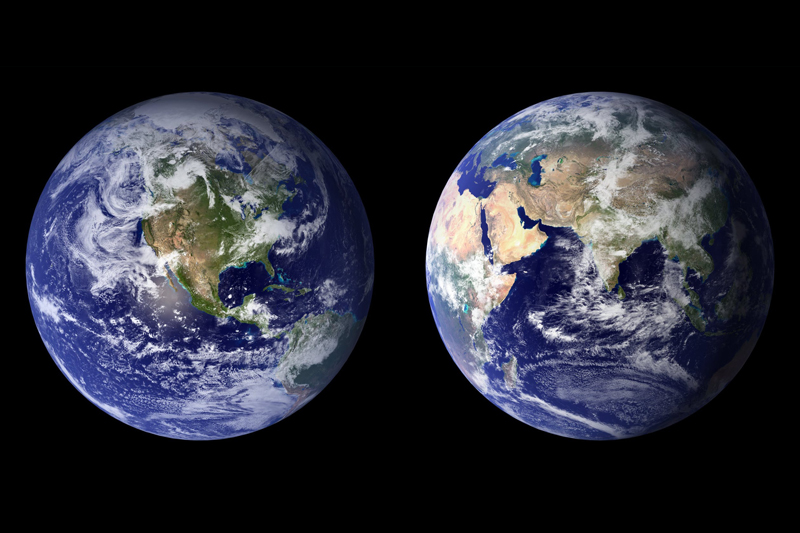Global Cooling?

Global warming activists may need to revise their arguments soon. The National Oceanic and Atmospheric Administration (NOAA) recently reported that December of 2007, and January and February of 2008 recorded the coolest temperatures around the world in seven years.
Though you may get an argument if you tell it to a resident of the Midwest, the U.S. experienced warmer temperatures this winter season than the global average. The Midwest, north, and Plains regions experienced record numbers of measurable snowfalls this season. But overall, the U.S.¡¯s average temperature was warmer than the rest of the world¡¯s temperatures. The States¡¯ average was 33.2¢ªF, which is 0.2¢ªF above the 20th century average, but still the coolest since 2001. Since historical data began being tracked in 1895, it was the 54th coolest winter ever, according to the NOAA¡¯s website.
Scientists attribute this season¡¯s cooler temperatures to a strong La Nina, which is the cooling of the sea surface in the Pacific Ocean. The strength of this phenomenon can affect climate conditions around the world. However, La Nina typically creates drier conditions due to the cooling temperatures, but this season, affected areas experienced more precipitation.
World-wide, snow cover in the Northern Hemisphere during the month of February was at above-average levels. Southern China has suffered from harsh winter storms that are atypical for the region. Experts are still examining the causes of these storms but say it is possible that ¡°Unusually high water temperatures in the China Sea may have triggered available moisture that enhanced the severity of these storms,¡± according to the NOAA.
December-February 2008 temperatures were above average in Europe, western and central Russia, parts of eastern Asia. However, cooler-than-average conditions occurred from the Middle East region to parts of China, and parts of Australia.
According to the NOAA, ¡°The combined global land and ocean surface temperature was the 16th warmest on record for the December 2007-February 2008 period (0.58¡ÆF/0.32¡ÆC above the 20th century mean of 53.8¡ÆF/12.1¡ÆC).¡±
The NOAA does not imply that this winter will start a trend in either direction regarding global warming or cooling.
Though you may get an argument if you tell it to a resident of the Midwest, the U.S. experienced warmer temperatures this winter season than the global average. The Midwest, north, and Plains regions experienced record numbers of measurable snowfalls this season. But overall, the U.S.¡¯s average temperature was warmer than the rest of the world¡¯s temperatures. The States¡¯ average was 33.2¢ªF, which is 0.2¢ªF above the 20th century average, but still the coolest since 2001. Since historical data began being tracked in 1895, it was the 54th coolest winter ever, according to the NOAA¡¯s website.
Scientists attribute this season¡¯s cooler temperatures to a strong La Nina, which is the cooling of the sea surface in the Pacific Ocean. The strength of this phenomenon can affect climate conditions around the world. However, La Nina typically creates drier conditions due to the cooling temperatures, but this season, affected areas experienced more precipitation.
World-wide, snow cover in the Northern Hemisphere during the month of February was at above-average levels. Southern China has suffered from harsh winter storms that are atypical for the region. Experts are still examining the causes of these storms but say it is possible that ¡°Unusually high water temperatures in the China Sea may have triggered available moisture that enhanced the severity of these storms,¡± according to the NOAA.
December-February 2008 temperatures were above average in Europe, western and central Russia, parts of eastern Asia. However, cooler-than-average conditions occurred from the Middle East region to parts of China, and parts of Australia.
According to the NOAA, ¡°The combined global land and ocean surface temperature was the 16th warmest on record for the December 2007-February 2008 period (0.58¡ÆF/0.32¡ÆC above the 20th century mean of 53.8¡ÆF/12.1¡ÆC).¡±
The NOAA does not imply that this winter will start a trend in either direction regarding global warming or cooling.

Related Articles
Editor's Picks Articles
Top Ten Articles
Previous Features
Site Map
Content copyright © 2023 by Nicole Collins. All rights reserved.
This content was written by Nicole Collins. If you wish to use this content in any manner, you need written permission. Contact Ije Yvonne for details.


